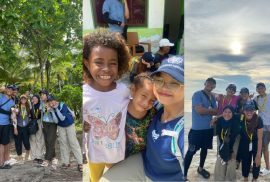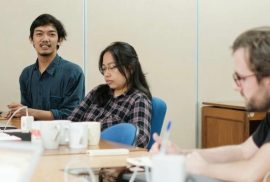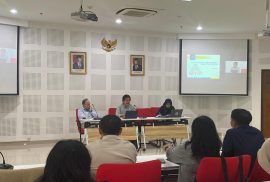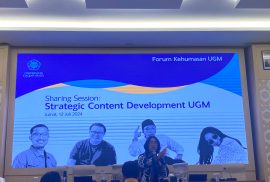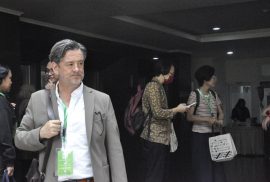Davina Santosa, a student from the Tourism Study Program, Faculty of Cultural Sciences, Universitas Gadjah Mada, had the opportunity to undertake the Community Service Program (KKN-PPM UGM) on Nusi Island, Padaido Islands, Biak Numfor Regency, Papua. Together with the KKN team “Biak Elok,” they began their journey on June 29, 2024, under the guidance of Dr. Eng. Ir. R. Rachmat A. Sriwijaya, S.T., M.T., IPM., ASEAN, and will complete their activities on August 20, 2024.
Davina chose to join this team because she wanted to explore the lives of people outside Java. She was interested in understanding the social, cultural, and economic aspects of the local community. Davina felt it was important to know the characteristics of the community, the social approaches they take, and the challenges they face daily.
On Nusi Island, Davina and her team identified several key issues that need attention. First, there is economic disparity where job options are very limited as fishing is their only option. Second, accessibility to meet daily needs is very difficult. Third, lack of basic knowledge about cleanliness and health. Fourth, the allocation of village funds is uneven.
Their KKN theme is “Development of Tourism Potential and Human Resource Improvement Based on Community-Based Tourism Framework to Achieve Independence, Inclusivity, and Sustainability on Nusi Island, Padaido District, Biak Numfor Regency, Papua.” In implementing this program, Davina found that there was no active tourism awareness group in the Padaido Islands. The last one was in Samberpasi, formed by the Biak Elok KKN Team in 2019, but it is no longer active. This shows that public awareness of the importance of sustainable tourism management is still very limited.
Additionally, Davina also found that community knowledge about waste management is very lacking. In Nusi and several other islands such as Samberpasi, Pasi, and Auki, garbage bins are rarely found in residents’ homes. Organic waste is usually given to their pets such as dogs and pigs, while other waste is collected and burned. Therefore, one of their KKN programs focuses on educating about better and sustainable waste management.
Despite the social issues they face, Nusi Island has extraordinary natural wealth. The sea water, which is still relatively unpolluted, is a clear blue. Additionally, there are many World War II relics both on land and in the sea, such as the foundations of war vehicle runways in every house on Wundi Island.
The culture of sirih pinang here becomes a social interaction medium. Additionally, traditional dances like Yospan and various musical instruments such as tifa are part of the rich culture. The community also has interesting Christian worship traditions; if there is grief or a send-off of children for education, it is celebrated with worship from night until dawn. Furthermore, they believe that Sunday is God’s day, so they are not allowed to work. Children attend Sunday school every Sunday at 8 a.m., followed by church service at 9 a.m.
Socially, the people of Nusi Island are very friendly. There is a market day, which is a day when the market is held. Market days are held three times a week, namely on Tuesday, Thursday, and Saturday. On Monday, Wednesday, and Friday, they usually go fishing, and their catch will be sold the next day on market day. Because not all residents have boats, they often hitch rides to the market in the city, which adds to the closeness among the residents.
After several weeks living in Nusi, Davina experienced the simple and full-of-struggle life of the community to meet their daily needs. Limited infrastructure and electricity make it difficult for the community to explore new things that could support their livelihoods or improve their quality of life. One of the challenges they face is that electricity is only available for 12 hours a day, from 6 p.m. to 6 a.m. As a result, ice blocks are very difficult to find. In fact, ice blocks could be used to preserve their catch, which could create new business opportunities such as making shredded fish, fish sticks, etc.
In addition to having the opportunity to explore the easternmost region of Indonesia, Davina also learned that economic and educational disparities still exist. People on the other side of Papua still really need help, both in terms of funding, accessibility, infrastructure, and knowledge expansion. However, despite living in simplicity, they can still be happy.
The KKN experience on Nusi Island provided many valuable lessons about the lives of Papuans, especially those on Nusi Island, Padaido Islands, Biak Numfor Regency, Papua. With enthusiasm and hard work, Davina and her team hope that this KKN program can contribute positively to the development of tourism potential and human resource improvement in the Padaido Islands, Biak Numfor Regency, Papua.

